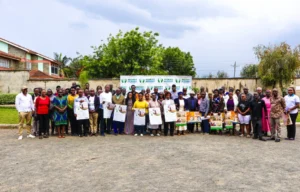
In the ever-evolving landscape of crisis response, the continuous training of Psychological First Aid (PFA) Trainers of Trainers (ToTs) is paramount.
Regular updates ensure that these master trainers remain adept with the latest methodologies and insights, enabling them to effectively disseminate current best practices.
This ongoing education enhances their skills and empowers them to cultivate a cadre of proficient responders equipped to address diverse psychological needs during emergencies.
Continuous training fosters adaptability, allowing trainers to tailor their approaches to various cultural contexts and emerging challenges.
By investing in the perpetual development of PFA ToTs, MIDRIFT HURINET strengthens the foundation of community resilience, ensuring that support systems are dynamic and responsive in times of crisis.
In this regard, MIDRIFT HURINET, in partnership with the Nakuru County Department of Health Services, is conducting a four-day Psychological First Aid (PFA) Master TOT Training, courtesy of the generous support from DIGNITY.
Participants are drawn from MIDRIFT HURINET human capital and different cadres of County Department of Health Services officers.
The training objectives are to ensure the TOT master trainers are familiar with the PFA Training (Providers and Trainers), enhance training and facilitation skills and build knowledge & skills around implementation, planning and scaling of PFA and Evaluation criteria in assessing PFA-related situations.
World Health Organization and the Red Cross have developed training tools they will use.
Incorporating tools developed by the World Health Organization (WHO) and the Red Cross into the training of Psychological First Aid (PFA) Master Trainers is essential for ensuring a standardized and practical approach to crisis intervention.
These organizations have meticulously crafted evidence-based resources encompassing various scenarios and cultural contexts, providing trainers with comprehensive guidance on delivering PFA.
Utilizing these tools ensures that Master Trainers are well-versed in globally recognized best practices, enabling them to offer immediate, compassionate support to individuals experiencing distress due to emergencies or disasters.
These resources often include detailed modules and practical exercises, enhancing the trainers’ ability to convey complex concepts in an accessible manner.
By integrating WHO and Red Cross materials into their curricula, PFA Master Trainers can maintain a high standard of care, fostering resilience and promoting mental well-being within affected communities.
Having PFA (Psychological First Aid) Master Trainers in Nakuru County is crucial for building a resilient and responsive support system during crises.
These trainers will be equipped to educate local caregivers, practitioners, and community members in providing immediate, compassionate assistance to individuals experiencing distress due to emergencies or disasters.
By disseminating PFA skills, Master Trainers ensure that support is culturally sensitive and contextually appropriate, fostering a sense of safety, calm, and hope among affected populations.
This localized training approach enhances the community’s capacity to manage psychological impacts and strengthens social cohesion and
collective recovery efforts.
In the training session, the Trainees will be taught facilitation skills, Practising facilitation skills. Field assessment on PFA supervision and self-care for trainers and providers.
Regular retraining in facilitation skills is essential to keep these trainers proficient in guiding discussions, managing group dynamics, and fostering an inclusive environment where all participants feel valued.
Such continuous development ensures that Master Trainers can effectively adapt to varying learning styles and cultural contexts, thereby enhancing the overall impact of PFA programs.
By honing their facilitation abilities, they convey information and inspire and empower others to provide compassionate support during crises.
Regular retraining of Psychological First Aid (PFA) Trainers of Providers in field assessment and supervision is essential to maintain the efficacy and relevance of PFA interventions.
By engaging in continuous professional development, Master Trainers can stay abreast of the latest methodologies and best practices, ensuring that their assessments are accurate and their supervisory techniques are effective.
This ongoing learning process enables them to adapt to evolving challenges in the field, providing tailored support to those in crisis.
Retraining fosters a culture of reflective practice, encouraging trainers to critically evaluate their approaches and make necessary adjustments to enhance outcomes.
Ultimately, this commitment to continual improvement strengthens the overall impact of PFA programs, leading to more resilient and well supported communities.
Retraining of Psychological First Aid (PFA) Trainers of Providers in self-care is essential to ensure they can effectively support others while maintaining their well-being.
Engaging in consistent self-care practices has been clinically proven to reduce or eliminate anxiety and depression, reduce stress, and increase happiness.
By prioritizing their mental health, trainers can better manage the emotional demands of their role, serving as resilient role models for their trainees.
This commitment to self-care enhances their well-being and ensures they remain effective, empathetic, and present when guiding others through crises.
They begin by conducting thorough assessments to identify individuals exhibiting signs of psychological distress, ensuring that support is directed where needed.
Utilizing their refined facilitation skills, these trainers create safe and empathetic environments, allowing affected individuals to express their emotions and concerns without fear of judgment. This approach alleviates immediate distress and fosters a sense of trust and security within the community.
Beyond immediate intervention, PFA Master Trainers will play a pivotal role in strengthening the community’s resilience.
They organize and lead training sessions to educate local responders and community members on PFA principles, expanding the support network available during crises.
By promoting self-care practices and emphasizing the importance of mental well-being, these trainers help cultivate a culture of proactive mental health care.
Their ongoing commitment to professional development ensures they remain adept at addressing evolving mental health needs, ultimately contributing to a more resilient and supportive community environment.
By:Jacob Karani & Britney Marcella


